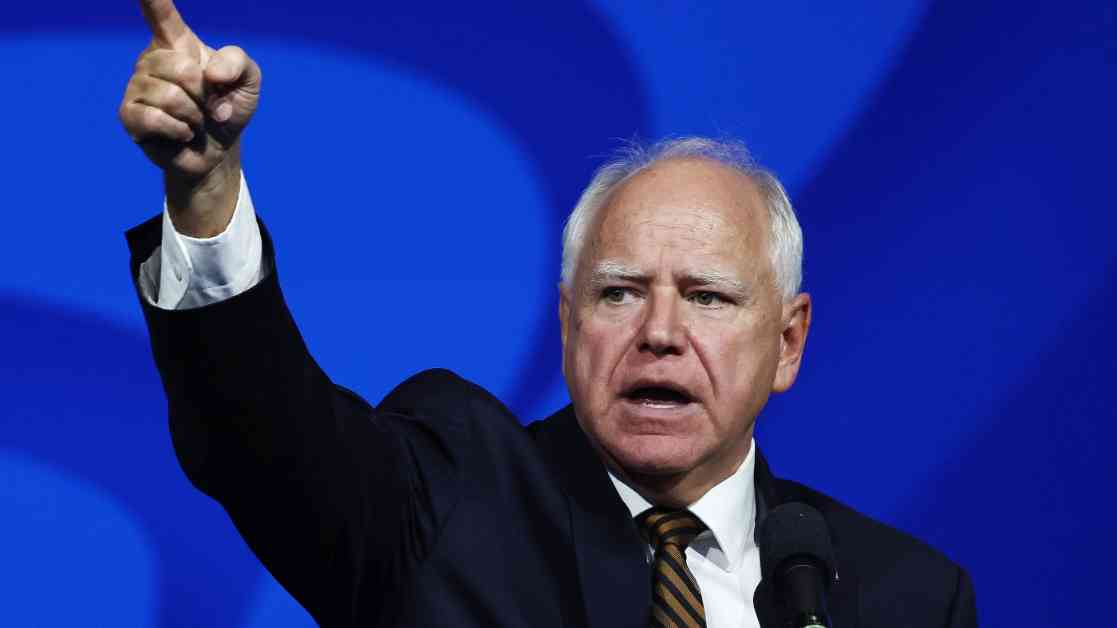Tim Walz’s Impact on Chinese Students and Teachers: A Positive Review
As the Democratic vice presidential candidate and Minnesota Governor Tim Walz gains attention on the national stage, his impact on Chinese students and teachers has garnered positive reviews. From his early days teaching English at Foshan No. 1 Middle School in southern China to his continued engagement with the country through various educational exchanges, Walz’s experiences have left a lasting impression on those he interacted with.
### Early Connections in China
In 1989, a 15-year-old Christy Dai crossed paths with Walz, who became her first foreign English teacher at Foshan No. 1 Middle School. Walz’s dedication to teaching English and U.S. history to around 300 students left a lasting impact on Dai and her classmates. His approachable nature and genuine care for his students earned him the nickname “Ah-Tim” and the admiration of his colleagues, like retired teacher Lee Nai-Tim.
Lee fondly remembers Walz as a thoughtful and compassionate teacher who went above and beyond for his students. Despite being the only teacher with an air conditioner in the school, Walz often chose to go without it to conserve electricity during unreliable supply periods. This selfless act resonated with his students and colleagues, showcasing his humility and dedication to fostering connections.
### Bridging Cultures Through Education
Walz’s commitment to fostering cross-cultural connections extended beyond the classroom, as he led Minnesota high school students on summer trips to China in the ’90s and early 2000s. Students like Emily Scott and Laura Matson reflect on their transformative experiences under Walz’s guidance, where he encouraged them to be open-minded and embrace new perspectives.
Scott recalls Walz’s emphasis on curiosity and learning during their trip, inspiring her to pursue Chinese language studies and a career involving frequent visits to China. Matson, too, highlights the meaningful connections formed during their travels, emphasizing the importance of building bridges with others through shared experiences.
### Navigating Geopolitical Challenges
While Walz’s interactions with China have been predominantly positive, his stance on the country’s policies and human rights issues has not gone unnoticed. As a congressman, Walz co-sponsored legislation that took a firm stance on China and met with prominent figures like the Dalai Lama and Hong Kong democracy activist Joshua Wong, signaling his commitment to advocating for human rights and democracy.
Despite facing scrutiny from Republican critics over his connections to China, Walz has maintained a balanced approach to U.S.-China relations. He acknowledges the need for cooperation in certain areas while standing firm against China’s aggressive actions, such as its activities in the South China Sea. Walz’s nuanced understanding of China’s complexities and his advocacy for human rights have positioned him as a principled leader in navigating the complexities of U.S.-China relations.
### The Path Forward
As Walz’s profile continues to rise on the national stage, his experiences in China offer a unique perspective on bridging cultural divides and fostering meaningful connections. Professor Zhiqun Zhu of Bucknell University views Walz’s firsthand experience with China as a potential asset in smoothing bilateral relations, citing his deep understanding of China’s culture and society.
However, as geopolitical tensions between the U.S. and China escalate, Walz may face challenges in balancing cooperation with firmness in addressing contentious issues. The Chinese government’s cautious response to Walz’s candidacy reflects a wait-and-see approach, indicating uncertainty about the potential implications of his leadership on U.S.-China relations.
In conclusion, Tim Walz’s impact on Chinese students and teachers paints a nuanced portrait of cross-cultural exchange and educational diplomacy. From his early days as a teacher in Foshan to his advocacy for human rights as a congressman, Walz’s interactions with China highlight the power of personal connections in fostering understanding and cooperation between nations. As the political landscape evolves, Walz’s experiences in China may serve as a valuable asset in navigating the complexities of U.S.-China relations and promoting mutual respect and collaboration on the world stage.

